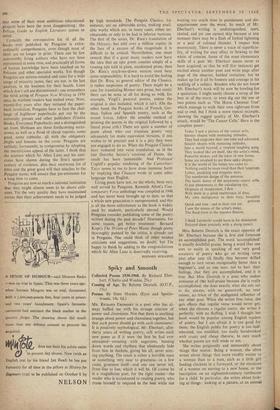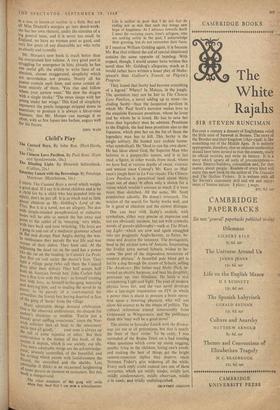Spiky and Smooth
Coming of Age. By Babette Deutsch. (O.U.P., 15s.)
MR. RICHARD EBERHART is a poet who has al- ways baffled me with his strange mixture of power and clumsiness. Not that there is anything strange about power and clumsiness together, but that such power should go with such clumsiness! It is positively mythological. Mr. Eberhart, after thirty years of writing poetry, still writes each new poem as if it were the first he had ever attempted—sweating with eagerness, hunting down words and rhythms that obstinately hide from him in thickets, giving his all, never stint- ing anything. The result is either a horrible mess or something very near 'to greatness—in a few cases, greatness itself—and one can never tell, from line to line, which it will be. Of course he is a magnificent poet, for the right reader—the reader who is accustomed to reading poetry, who trusts himself to respond to the best while not
wasting too much time in puzzlement and dis- appointment over the worst. So much of Mr. Eberhart's writing is undistinguished, inert, clotted, and yet one cannot skip because at any moment there may be a flash of forked lightning or a peal of colossal thunder. I respect him enormously. There is never a trace of superficia- lity, of writing for easy effect or bowing to the whim of coteries. Some of the most elementary skills of a poet Mr. Eberhart seems never to have acquired, so that he will (for instance) get excited about another poet and write page after page of the sheerest, baldest imitation; but he makes up for it all by honesty and courage in his tackling of a subject. Readers who do not know Mr. Eberhart's work will by now be howling for a quotation; I might easily choose a scrap of the best or of the worst, or even dig out the one or two poems such as 'The Horse Chestnut Tree' which manage to walk their own tightrope from end to end; but I think a more typical example, showing the rugged quality of Mr. Eberhart's attack, would be 'The Cancer Cells.' Here is the complete poem:
Today 1 saw a picture of the cancer cells, Sinister shapes' with menacing attitudes.
They had outgrown their test-tube and advanced, Sinister shapes with menacing attitudes.
Into a world beyond, a virulent laughing gang. They looked like art itself, like the artist's mind, Powerful shaker, and the taker of new forms. Some are revulsed to sec these spiky shapes; It is the world of the future too come to. Nothing could be more vivid than their language, Lethal, sparkling and irregular stars, The murderous design of the universe,
The hectic dance of the passionate cancer cells. O just phenomena to the calculating eye, Originals of imagination. I flew
With them in a piled exuberance of time, My own malignance in their racy, beautiful gestures Quick and lean: and in their riot too I saw the stance of the artist's make, The fixed form in the massive fluxion.
I think Leonardo would have in his disinterest Enjoyed them precisely with a sharp pencil.
Miss Babette Deutsch is the exact opposite of Mr. Eberhart because she is first and foremost an accomplished poet. The word 'accomplished' is usually doubtful praise, being a word that one uses so easily in speaking of not very good amateurs of poetry who go on writing verse year after year till finally they become skilled enough to turn verses recognisably better than a beginner's, and so one says. not to hurt their feelings, that they are accomplished, and it is true. But Miss Deutsch is a poet who makes nonsense of that half-praise because she is really accomplished; she does exactly what she sets out to do, always, with no 'guesswork, no near misses, no trace of the undigested influence of any other poet. When she writes free verse, she gets effects that regular verse would never get; when she chooses a regular metre, she writes it perfectly, with no fluffing. I wish I thought her book would be popular among English readers of poetry, but I am afraid it is too good for them; the English public for poetry is too half- educated, too muddled, too easily hoodwinked with ersatz and cheap rhetoric, to care much whether poems are well made or not.
She writes poignantly and memorably about things that matter. Being a woman, she often writes about things that more readily matter to a woman than to a man, such as a little girl feeding chickens in a farmyard, or the emotions of a woman on moving to a new house, or the inscription on an eighteenth-century tombstone for a child. In particular, she writes about look- ing at things: looking at a picture, at an animal in a zoo, at leaves.or stubble in a field. But not all Miss Deutsch's energies go into detail-work; she has her own rhetoric, under the stimulus of a big general issue, and it is never too small. In England, we have no woman poet as good, and very few poets of any discernible sex who write as cleanly and honestly.
Mr. Moraes's new book is much better than his overpraised first volume. A very good poet is struggling for emergence in him; already he has one useful gift, the ability to write lines of an absolute, almost exaggerated, simplicity' which are nevertheless not prosaic. Nearly all his Poems contain such lines, and some consist al- most entirely of them. 'You rise and follow where your sorrow went.' He slew the dragon
with a single stroke.' The swan sleeps with her Young under her wings.' This kind of simplicity represents the poetic language stripped down to essentials; to produce it is always a hit-or-miss business; that Mr. Moraes can manage it so often, with so few lapses into bathos, augurs well for his future.
JOHN WAIN











































 Previous page
Previous page